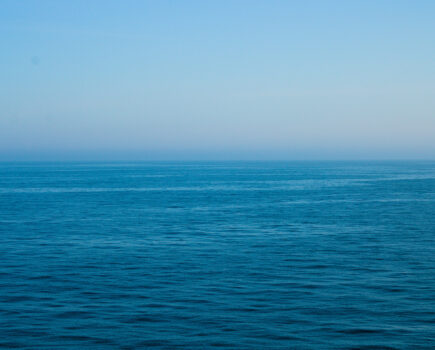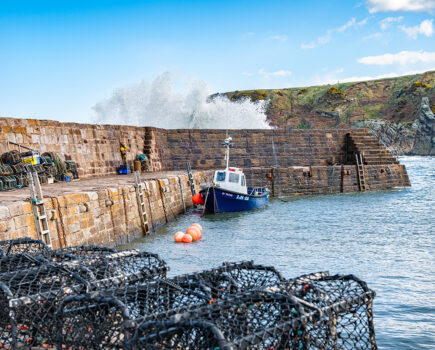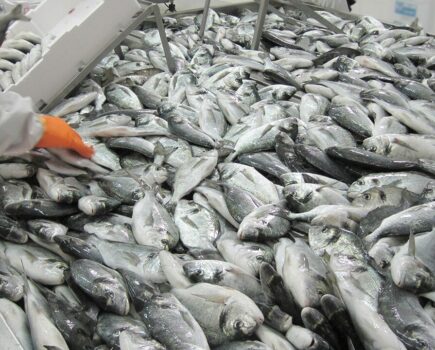Joint industry-government action group set up
The coronavirus emergency is creating a ‘profound economic crisis’ for the UK fishing industry and ‘potentially existential challenges’ for some businesses, reports Tim Oliver.
The crisis is hitting all sectors and regions of the entire fishing industry, from catchers to processors and ancillary industries.
The unprecedented measures being taken to combat the crisis have created a liquidity crisis in fishing businesses, where demand has reduced or dried up completely.
Shellfish is particularly hard-hit, with France, Italy and Spain – major outlets for shellfish – effectively closed, and the closure of restaurants and hotels also strongly reducing demand.
Sarah Horsfall of the Shellfish Association of Great Britain (SAGB) said that things were ‘changing from day to day’. She told Fishing News: “Three different companies now have told us that 100% of their orders from the EU have been cancelled. Three isn’t a massive number, but I suspect that if they are being affected, there will be others as well.” She added: “We are in touch with the government almost on a daily basis.”
Jamie McMillan, MD of Loch Fyne Langoustines and Loch Fyne Seafarms, which process and export scallops, lobster and crab, told the Guardian: “Spain has closed and France is about to close its markets. If it continues, we’re going to have to tell our fishermen to stop fishing.” He said the company’s trade went from 3,000 shells on 9 March to zero on Tuesday last week (17 March).
- A joint fishing sector-government action group has been formed to work on urgent measures to support the fishing industry through the emergency.
- Following a telephone conference involving a wide range of stakeholders from across the country, the supply chain and government, it was agreed to work on a support package in four key areas:
- The development of alternative markets and alternative routes to market. The government has a role in facilitating the shift to meet new demand in the domestic market
- Direct and indirect financial support, including understanding the chancellor’s £350bn support package and how this will be of use to the fishing sector, and to identify where additional support will be require.
- Development of a joint industry-government approach to the different aspects of the crisis as they evolve.
A smaller, more focused group will work up proposals.
Commenting on the outcome of the conference, NFFO chief executive Barrie Deas, who took part, said the ‘profound economic crisis’ meant all fish industry businesses face ‘potentially existential challenges, related to short-term liquidity’. Crew incomes would be ‘directly and immediately affected’.
The shock to the fishing sector, although temporary, was likely to be ‘very severe’.
He said that the government and industry had agreed on a partnership approach to tackling the problem in what was ‘an evolving situation’.
There would be a direct impact on the industry as crews become infected, or self-isolated in line with government advice. There would be indirect but powerful effects caused by ‘dramatic falls in demand in different parts of the market’.
These include the restaurant and hospitality trade, where there will be ‘zero or close to zero demand’ as it is forced to close down as the public responds to social distancing advice.
The export trade will be hit as intermediary firms stop buying fish and shellfish for which there is no market demand, or where there are transport/regulatory obstacles.
Supermarkets are closing fish counters and experiencing increased demand for tinned and frozen fish. This limits the potential to expand the domestic market for fish and shellfish. Doorstep deliveries of fresh fish by van have great potential (see below), and are being trialled in Cornwall and other locations.
“The scale of the coronavirus crisis has been described by government as requiring a regulatory response akin to putting the economy on a war footing,” said Barrie Deas.
“The challenge is to build a package of support that is relevant to the fishing sector. Overall, there is a determination, where it is an option, to keep boats at sea, keep crews intact, keep supply chains supplied, keep continuity of food security.
“In cases where demand has fallen away completely, support will need to take the form of maintaining the potential to start again when the health crisis diminishes.” This would mean:
- Support to keep fleets working and supply chains maintained
- A form of tie-up aid where markets have collapsed completely.
“This is the task facing the fishing sector and government as we try to build a response adequate to the scale of the crisis,” said Barrie Deas.
‘Great concern’ in South West
The Cornish FPO said there was a great deal of uncertainty that was likely to continue. Along with other POs in the region, the CFPO is liaising with the three South West auctions at Newlyn, Brixham and Plymouth.
CFPO chief executive Paul Trebilcock said that market demand and prices had fallen across the board, particularly for shellfish.
In a post on the Newlyn harbour blog ‘Through the Gaps’, he said: “Shellfish merchants (crab and lobster) have almost entirely ceased taking any shellfish. Some prime fish including Dover sole is currently holding in terms of price, but this should not be seen as assured or long-term.
“The CFPO has already recommended that trips should be kept short, minimising the risks of landing higher volumes from longer trips that could be difficult to sell.
“We are going to keep in close liaison with other South West POs and markets on an ongoing basis, and will endeavour to keep you informed as more information emerges.”
Referring to discussions with DEFRA on a support package (see above), he said this was ‘in early stages and almost certainly won’t be a quick fix’.
He said: “Given the poor start to the year, weather-wise, many parts of the fleet are entering this crisis with very little resilience/money in the bank, therefore measures must be genuine and include both real money and regulatory considerations.
“We will do everything we can to support you during this worrying period. We will be bringing you a Fathom podcast very soon with advice and guidance on direct selling, and updates from DEFRA on financial support for fishermen.
“We are also working with our Seafood Cornwall initiative to help keep up the demand for fish and shellfish in Cornwall and support local fishermen and fishing communities.”
At Plymouth, Dave Pessell of auctioneer Plymouth Trawler Agents said he was very concerned about the situation.
“Our attitude as an agent is to give the boats the best advice we can,” he told Fishing News.
“We’re telling the beam trawlers to keep trips as short as economically possible, which extends the shelf life of their fish and means they’re not risking too much.”
He said that prime prices were holding up ‘reasonably well’, although they were coming down. “I’ve got a feeling they could collapse, but I don’t know,” he said. “We’re saying to the boats that it’s not our job to tell you to stop fishing. I think they will carry on either until there’s no market, or prices are so low it’s not worth going to sea.”
He said the scallop market was ‘pretty poor’ because of restaurants and hotels closing.
He added, however, that with concerns being expressed about food supplies, the crisis was ‘a heaven-sent opportunity’ to open up new markets in this country.
He found it ‘staggering’ that the UK exports 70% of its catch and imports 70% of what it consumes.
“There’s an opportunity out there now, but that depends on the supermarkets being willing to offer these different species, and dropping the price a bit. It’s a good healthy food source, with plenty of protein. There’s a certain amount of frustration.
“To add to the problems, the inshore fleet – and I’m not just talking about the under-10s – has had an absolutely dire February with non-stop gales. This is the first week they’ve had a chance to get back to sea seriously, and they’re faced with all these difficulties.”
Prawn boats tie up in Scotland
Some Scottish prawn boats have had to tie up because of the lack of demand for prawns, and efforts are being made to restrict the activities of the fleet.
Mike Park, chief executive of the Scottish White Fish Producers’ Association (SWFPA), said there had been problems of oversupply in the Nephrops sector since the middle of last year. The excess catches had gone into cold stores, but the capacity and willingness of buyers to store Nephrops had reached its limit.
“Some processors are saying, ‘That’s it, we can’t take any more prawns,’ which is starting to see the prawn fleet tie up and reduce their outgoings,” said Mike Park.
“Some boats are turning to supply the whitefish market, but things like monkfish and ling are not doing that well on price. Other things like haddock are reasonable, and megrims are still buoyant.”
He said that with the traditional scarcity of haddock in the North Sea at this time of year and their poor yield after spawning, some boats were now pursuing the Rockall haddock fishery.
“Given that the market will now be fickle and won’t be able to receive the same amounts, there are discussions going on about what we can do to restrict the fleet’s activity without removing its efficiency,” he said.
But he said that the industry had not been very good at self-regulation in the past, and he believed the Scottish government would ‘very soon’ introduce some sort of guidelines on restrictions on fishing.
The most badly hit sector from the start of the year has been the inshore static-gear fleet, which has had bad weather to contend with for almost all of this year, and has now been hit by the closure of restaurants and hotels, and by the loss of the markets in Europe.
He added that the scallop sector was also ‘up against it’. It was supplying the same top-end markets, and buyers were not going to buy scallops and hold them in cold stores for similar reasons to the prawn sector.
“All in all, it’s not a rosy picture for the mass of the industry,” said the SWFPA chief.
“I guess what we need to do is ask for help to maintain elements of the industry that are under severe stress. But the position of government is not to just hand out cash to people – it’s to put in place appropriate systems to make sure that businesses will still be there at the end of it.”
Grimsby market ‘open for business’
Grimsby market chief Martyn Boyers said that the east coast market is open for business and intends to remain so, but the situation is volatile.
There were reduced supplies, and buyers faced greatly differing circumstances. “It’s very difficult to predict what’s going to happen,” he told Fishing News.
“We’ve maintained the market every day. We’ve taken steps to keep operating, and stepped up hygiene and sanitation. We’ve stopped visitors to the market, and we’re asking fish delivery drivers to stay in their cabs.
“It’s important that we have continuity, and that people have the opportunity to buy fish.”
He said that supplies are down a bit, but fish was still arriving from Iceland in containers, despite some Icelandic ships having tied up because the North American market is closed.
“Volumes are down this week, and we can’t expect a lot of fish next week, but we think there’s enough to keep the business open and provide the service to the processors in Grimsby.”
He said that prices collapsed at the start of last week, but two days later they picked up, and cod last Thursday was making good money – £3.80-£3.90/kg. “That’s the irony – you need a crystal ball to be correct on this job,” said Martyn Boyers, who is chief executive of Grimsby Fish Dock Enterprises and also chairman of the Fishing Ports Group of the British Ports Association.
He said that, as in any crisis, there were winners and losers. Many door-to-door van salesmen operate from Grimsby, and they were all doing well.
“They can’t get enough fish – they all bought extra fish and sold out. Some who go down to London have gone to Billingsgate to top up. Some merchants had big orders, but conversely, Sainsbury’s – mainly supplied by Young’s – have closed their fresh fish counters.
“Some processors who supply some of the big restaurants don’t want to buy, so you can see the extremes. That’s the problem – we work in a volatile business, but this has just made it more volatile.”
He pointed out that people will still need to eat whatever happens, and that demand for fish is strong – frozen food cabinets in supermarkets were emptied of fish cakes, fish fingers and other frozen products.
“We, as a port, are in the middle, between processors and catchers, and we’re doing our bit to keep it going. The good thing about the fishing industry is there is a lot of resilience, and people will keep going until they can’t keep going.”
Fishing News Awards 2020
In light of the ongoing coronavirus situation, it is with great regret that we have decided to cancel the presentation evening for the Fishing News Awards 2020, previously scheduled for 14 May.
The awards programme will otherwise continue as planned. The voting process continues in those categories that require it, at: fishingnews.co.uk/awards Voting closes at midnight on 17 April, and winners will be selected as planned.
The results will be announced in the 21 May issue of Fishing News, on our website: fishingnews.co.uk and via our Twitter account @yourfishingnews #fishingnewsawards
Scottish Skipper Expo postponed
Scottish Skipper Expo 2020, originally scheduled for 15 and 16 May at the P&J Live arena in Aberdeen, has been postponed due to the continuing escalation of COVID-19 (coronavirus).
Hugh Bonner, managing director of show organiser Mara Media, said: “It is with great regret that we’ve decided to postpone Scottish Skipper Expo 2020; the wellbeing of our exhibitors and visitors is paramount.
“Postponing now also brings an end to any uncertainty among exhibitors and visitors about whether the expo was going ahead on the planned dates. We value tremendously the support of everyone involved in Scottish Skipper Expo, and we would like to thank them for their patience during this challenging time.”
Mara Media will now be working hard to identify a new date for Scottish Skipper Expo, and updates will be published on the show website at: bit.ly/33vvCUx as soon as is practicably possible.








